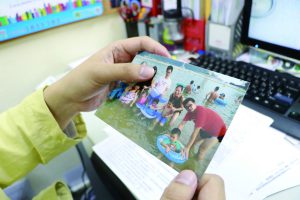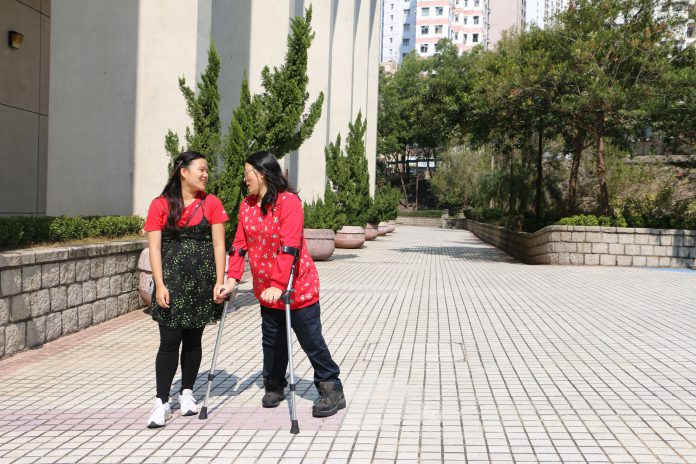Children with disabled parents gain different perspectives on life
By Marilyn Ma & Nancy Mak
On a chilly winter morning on the campus of Hong Kong Polytechnic University (PolyU), 21- year-old Mandy Wong Man-ling walks slowly beside her mother, who is using a crutch. Wong watches her mother closely, anticipating her needs and holding her tightly when she walks down a steep slope. Later, when the mother and daughter sit down to talk to Varsity, Wong puts a few pillows on the sofa before her mother sits down.
Wong is in her final year of a social work degree at PolyU and intends to become a social worker after she graduates. It is a vocation influenced by her parents, who are both disabled due to childhood polio which affected their mobility.
Wong’s mother, Jenny Tsang Lai-kwan has a more serious condition than her husband because infections of her central nervous system caused back damage and she is now mostly unable to take public transport. Tsang uses crutches most of the time and relies on taxis and rehabilitation buses to get around the city.
Luckily, her daughter has been at her side and helping her since she was small. Tsang recalls that from around the age of eight, she would take Mandy out during school holidays to develop her awareness and alertness to her needs. Whenever they took public transport, Mandy would learn how to prepare her mother to alight from the bus one stop ahead, help her get off, and be aware of locations for disabled access.
“I think I’ve been used to paying attention to others’ needs and contingencies since I was small, so I have a higher awareness of the people around us and greater willingness and motivation to work as a frontline carer,” says Wong.
Due to her disability, Tsang was unable to take the young Mandy out to many places for exploration and discovery. So she chose to spend more time with her daughter instead to make up for it. Tsang retired from her job as an assistant clerical officer in a Government department when Mandy was studying in primary three so they could have a closer relationship and more communication.
“I want her to understand more about me. In terms of the way I live, I’m different from the others,” says Tsang. “I don’t want her to feel inferior because of me.” As Tsang suffered from low self-esteem as a child, she wanted her own daughter to have a happy childhood.
Wong spends much more time with her mum than many others of her generation. They have breakfast together every morning and go to church together at the weekends. Tsang makes a point of getting to know her daughter’s classmates and friends without being afraid of letting them know about her disability. When Mandy was in secondary school, her mum would come to her school during lunchtimes and have lunch with Mandy and her friends. She wanted Mandy’s friends to know about her.
As a result, the pair has established a very close relationship. Wong likes to share everything with her mother and feels much love in her family.
“[My] parents’ disabilities are a kind of blessing, which have had a positive effect on me,” she says.
Tommy Lau Min has a similar parenting philosophy to Jenny Tsang. Lau became disabled after a car accident damaged his cervical nerves 11 years ago. Although he regained movement in his hands after years of physiotherapy, he still cannot walk and has to use a wheelchair.
After his marriage ended in divorce around three years ago, Lau took on the major share of raising his son Jonas, now five. Lau enjoys a very close relationship with Jonas but admits he used to worry that his son would feel inferior because he had a disabled dad. He takes Jonas to school in his wheelchair by having him sit on his lap and recalls that he used to drop him off one street earlier, letting their helper walk the rest of the way with him.
“It was because I didn’t want his classmates or other parents and teachers to find out that he has a disabled father, which would make him feel inferior,” says Lau.
Luckily, his fears were misplaced. One time, Lau picked Jonas up from school, he was very anxious at first but Jonas ran towards Lau when he saw him and immediately introduced him to his friends. At that moment, Lau felt very happy and grateful. He says he often experiences curious looks from the others on the street but Jonas has already adapted to it and it is no longer a problem.
Although his disability means he cannot go out to work, it also means Lau gets to spend a lot of time with his son. It is clear the two are close – Jonas loves sitting on his dad’s lap and says “I love Daddy the most” when asked if he likes his father.
Galant Ng Ka-lun and his wife also enjoy very close relations with their two children, aged three and one. The couple both suffer from visual impairment. Ng lost vision in his right eye after he had a retinal detachment 20 years ago and currently his left eye has only five per cent of its original seeing ability due to amblyopia. His wife has suffered from a degenerative eye disease since she was in Secondary Five.

Due to their weakened eyesight, they often accidentally hit and step on their children. They also find it difficult to identify words and objects. It seems their older child has developed ways to make up for this. He has a proactive character and often takes the initiative to help his parents, such as picking up objects and identifying routes.
“I think he became mature earlier than other kids,” says Ng. “For ordinary kids, they often let their parents or helpers lead the way, but for my son, I think our disability gave him an opportunity to get in touch with society earlier.”

Although Ng is grateful for his son’s mature character, he is concerned about the challenges the family will face as the children grow up. “They are still small, so they haven’t started to compare [themselves] with the others,” says Ng. “They still haven’t realised the differences between us and other parents.” Ng expects problems will arise down the road.
Obi Ho, a social worker at the Hong Kong Federation of the Blind, says there are many cases where parent-child relationships worsen during the children’s adolescence.
“Children will start to be rebellious and self-centred during the teenage years. They will try to hide the fact that their family is getting help from the Comprehensive Social Security Assistance (CSSA) and their parents are disabled,” says Ho.
Ho points out that many disabled parents have a relatively low educational level, so it is harder for them to find jobs and they are less able to earn a steady and reasonable income. As a result, conflicts about money issues are common. Children growing up in these families will have feelings of inferiority, resentment and unhappiness.
Billy So Kim-wan, a 31-year-old sign language teacher and sign language interpreter, had a rebellious childhood. Both of his parents are deaf and he had frequent conflicts with them, especially with his mother, about money issues. He always felt that his parents were stingy and obsessed with money and says they would go to extremes to save money.
“It is very common for children of deaf parents to feel that their parents act in strange ways that are hard to understand, and are different from how others behave,” says So.
He recognises these conflicts are the result of a structural problem where it is hard for deaf people to be well-educated and get a job with a decent wage, so they are always concerned about making ends meet. So did not hide his disagreement with his parents’ attitude towards money when he was young and would do the opposite of what they wanted throughout his childhood to show it.
Given his own experiences, So now wants to help to solve the structural problems that exist in families like his. He has done a lot of advocacy work related to sign language interpretation in order to improve education prospects for deaf people.
James Li Chun-kwok, a 21-year-old student, is also the child of deaf parents.
Both of Li’s parents lost their ability to hear and speak in childhood, so Li used sign language to communicate with them from childhood. With the frequent use of sign language at home, the young James had few opportunities to speak, which resulted in delayed speech and difficulties in communicating with peers.
Li also had conflicts with his parents during his childhood. He felt very annoyed whenever they asked him for help with sign language interpretation, especially when he was revising for the public exams. He thought his parents relied upon him too heavily.
But then there was a turning point when Li’s father had to be urgently hospitalised and needed him for sign language interpretation. He discovered that although sign language interpretation could be very annoying, it is really important. He put himself into his father’s shoes and gradually understood that his parents’ requests were signs of trust rather than reliance.
It is commonplace for children to provide sign language interpretation for their deaf parents, says Phyllis Wong King-shui, an assistant professor of the Social Work Department of the Chinese University of Hong Kong.
“They don’t need parents to take care of them, in contrast, they always take the role of taking care of their parents,” says Wong. This dynamic can produce positive outcomes in some cases and negative ones in others, depending on individual circumstances, she adds.
In general, Wong says the needs of children with disabled parents are often overlooked and neglected. “Actually, there is a service gap for helping these kind of families. There are no tailor-made service programmes to help them,” she says. Disability services focus on helping disabled parents, but do not take the needs of their children into account.
Wong says Hong Kong’s current policies on disability lag behind other developed societies and suggests the government should devise policies that consider the needs of families with disabled members as a whole. For instance, there could be tutoring services and experiential activities for the children of disabled parents as many of them lack the resources to further develop their talents.
Hopefully, with more assistance and recognition of their needs, the children of disabled parents will enjoy better family relationships and experience fewer family conflicts.
Edited by Rammie Chui











































